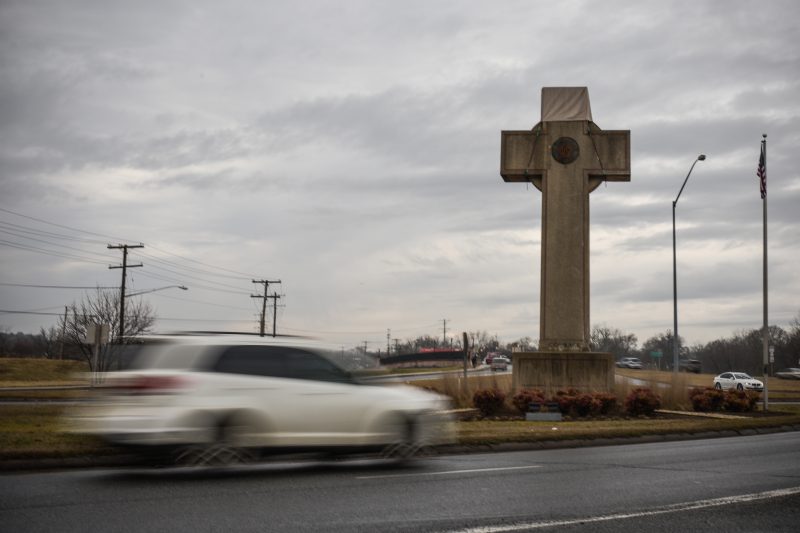US Supreme Court mulls whether giant cross is unconstitutional
The fate of the Bladensburg cross, a monument to local Maryland soldiers who died fighting in World War One, is being decided by the Supreme Court (Eric BARADAT)
Washington (AFP) – The US Supreme Court deliberated Wednesday on whether a giant cross that serves as a war memorial is an unconstitutional state religious endorsement, as secularist critics contend.
Supporters and critics of the 40-foot (12-meter) high Peace Cross in Bladensburg, just outside the capital Washington, presented arguments to the country’s top court, which will decide if the monument violates the First Amendment forbidding the state from promoting one religion over another.
The case is the latest example of the sensitive subject of religion-state links in America.
The cross was erected in 1925 in Maryland to honor the memory of 49 local soldiers killed in World War I, and now stands at the intersection of three busy roads.
During the hearing, justices focused on whether such a monument could be erected for other tragedies, such as in memory of victims of a shooting, regardless of religion — or whether it could be regarded as proselytizing.
For the Washington-based American Humanist Association (AHA), a plaintiff in the case, the monument represents a breach of the First Amendment because it is built on public land. The group says that $100,000 of public money has been used to maintain the cross, which they say essentially honors only Christian veterans.
“We are here to honor all veterans,” argued AHA lawyer Monica Miller.
– Symbol of ‘sacrifice’ –
“I think that there’s no history whatsoever of anyone using Latin crosses to honor Jews, Muslims, and atheists.”
Speaking to reporters, she added, “we are not seeking desecration or demolishment of crosses in general,” and an acceptable solution for the Bladensburg cross would include moving it to private land “where it will be better maintained” and away from traffic so veterans can pay their respects.
But Neal Katyal, lead legal counsel for the State of Maryland-National Capital Park and Planning Commission, the government agency which owns the land on which the memorial sits, said it has stood for nearly a century “as a symbol of that sacrifice and their service to this country.
“The memorial served a central non-religious function since 1925.”
A similar argument came from Michael Carvin, a lawyer for the American Legion, which originally helped build the monument.
Carvin said “the history and what the monument looks like, what it says, all underscore that secular point.”
He added: “The stakes are very high. I don’t think there is any rational basis for forcing this cross to come down, be sold or moved other than naked hostility towards religion.”
A lower court rejected the AHA’s initial filing.
“The display aggrandizes the Latin cross in a manner that says to any reasonable observer that the Commission either places Christianity above other faiths, views being American and Christian as one in the same, or both,” the initial ruling said.
In December 2016, an appeals court ordered that the cross be either torn down, changed or moved to private land.
– Other religions growing –
The American Legion, which represents military veterans, and the parks department, then appealed to the Supreme Court.
Since then, the administration of President Donald Trump, several members of which openly profess their Christian beliefs, has expressed support for the monument.
In a Supreme Court brief, the Department of Justice said removal or destruction of the cross “would be viewed by many as the action of a government that is not neutral but hostile on matters of religion.”
The court is not due to render a decision until June, and its finding will have an impact on numerous monuments around the country, including the two crosses at the Arlington military cemetery on the edge of Washington.
The Supreme Court, which under President Donald Trump has tilted to a 5-4 conservative majority, could use the case to set a precedent as to how lower courts should interpret the First Amendment.
“Congress shall make no law respecting an establishment of religion,” the Amendment says, while it also guarantees freedom to exercise religious beliefs.
That has left numerous grey areas in a country where Christians are still a majority and dollar bills state: “In God We Trust.”
In recent years, however, the growing number of other religions, and of atheists, in the country has led to a rising chorus of protest about Christianity’s dominance in US cultural life.
Disclaimer: This story is published from a syndicated feed. Siliconeer does not assume any liability for the above story. Validity of the above story is for 7 Days from original date of publishing. Content copyright AFP.


